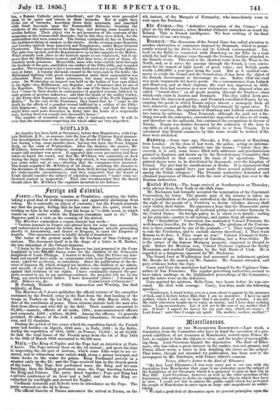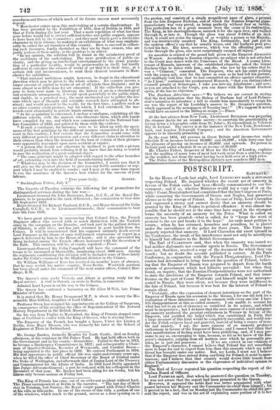Siortllautuno.
PRINCE ALBERT ON THE MANCH/WEIL Exittammor.—Last week, a deputation from the Committee who have in hand the execution of a pro- posed exhibition of art treasures at Manchester, waited upon Prince Al- bert, to explain to him the objects in view, and the modes of accomplish- ing them. Lord Overstone headed the deputation. The Earl of Riles- mere, who has taken a great interest in the matter, was not present, and Prince Albert wrote a letter to hint detailing his views on the subject. That letter, though not intended for publication, has been sent to the newspapers by Mr. Fairbairn, with Prince Albert's consent.
Prince Albert's Letter to the Earl of Bliesmeis.
"My dear Lord Ellesmere—I was very sorry not to see you with the deputation from Manchester that came to me yesterday upon the subject of the Exhibition of Art Treasures which it is proposed to open in that city May 1857. Lord Overstone, however, as well as the other members of the deputation, left nothing to desire in explaining the objects which they have in view. I could not fail to admire the public-spirit which has prompted the people of Manchester to enter upon so large and magnificent an under- taking. " We had a good deal of discussion upon its general principles, upon the soundness and fitness of which much of its future success must necessarily depend. "Manchester enters upon this undertaking at a certain disadvantage. It has been preceded by the Exhibition of 1851, that of Dublin in 1853, and that at Paris during the last year. That a mere repetition of what has thus gone before would fail to attract sufficient notice and public support, appears to have been felt by the Committee ; and they most wisely gave a distinctive character to their scheme, by making it an exhibition of what may emphati- cally be called the art treasures of this country. How to succeed in collect- ing such treasures, fondly cherished as they are by their owners, who are justly jealous of their safety, is the problem to be solved.
"in my opinion, the solution will be found in the satisfactory proof of the usefulness of the undertaking. The mere gratification of public cu- riosity, and the giving an intellectual entertainment to the dense popula- tion of a particular locality, would be praiseworthy in itself, but hardly sufficient to convince the owners of works of art that it is their duty, at a certain risk and inconvenience, to send their choicest treasures to Man- chester for exhibition.
"That national usefulness might, however, be found in the educational direction which may be given to the whole scheme. No country invests a larger amount of capital in works of art of all kinds than England; and in none almost is so little done for art education ! If the collection you pro- pose to form were made to illustrate the history of art in a chronological and systematic arrangement, it would speak powerfully to the public mind, and enable, in a practical way, the most uneducated eye to gather the les- sons which ages of thought and scientific research have attempted to ab- stract; and would present to the world, for the first time, a gallery such as no other country could produce, but for which, I feel convinced, the ma- terials exist abundantly in private hands among us. "As far as painting is concerned, I enclose a catalogue, exhibiting all the different schools, with the masters who illustrate them, which able hands have compiled for ine, and which was communicated to the National Gal- lery Committee of 1853, and printed by them with the evidence. "If such a catalogue, for instance, were to be filled up with the speci- mens of the best paintings by the different masters enumerated in it which exist in this country, I feel certain that the Committee would come with very different powers of persuasion and a very different claim to attention to then; owners than when the demand for the loan of certain of their pictures were apparently dependent upon mere accident or caprice. "A person who would not otherwise bo inclined to part with a picture would probably shrink from refusing it if he knew that his doing so tended to mar the realization of a great national object. "The same principle might be adopted with regard to the other branches of art, extending even into the field of manufacturing industry.
" Whatever may be the decision of the Committee, I assure you that it
w ill give me the greatest pleasure to give you any feeble assistance or sup- port which I may be enabled to render ; and I may at the same time repeat to you the assurance of the Queen's best wishes for the success of your labours.
"Ever yours truly, ALBERT. "Buckingham Palace, July 3."
The Gazette of Tuesday contains the following list of promotions for distinguished services during the late war- Lieutenant-General Sir John Burgoyne, Bart., G.C.B., of the Royal En- gineers, to be promoted to the rank of General ; the commission to bear date 5th September 1855. Major-General Sir Richard England, G.C.B. , and Major-General Sir Colin Campbell, G.C.B. to be Lieutenant-Generals ; their commissions to bear date 4th June 1856.
We have great pleasure in announcing that Colonel Dieu, the French
Engineer distinction officer who served with so much distction with the Turkish army n r the campaign on the Danube, and took part in the gallant defence of &lista.* is still alive, and has just returned in good health from the Crimea. It will be remembered that his supposed untimely death served Lord Panmure as the theme of some well-turned expressions of regret in a speech delivered by him in the House of Lords ; and it also prevented his being included among the French officers honoured with the decoration of the Bath. This omission will be, of course, repaired.—Times.
Lieutenant-General Sir Colin Campbell will have the command of the troops to be encamped at Shorneliffe, numbering about 5000 men. Among the regiments constituting this division will be included some of those lately under Sir Colin's command in the Highland division in the Crimea.
Sir William Williams of Kars has received six months' leave of absence, that he may revisit his native country, Nova Scotia. Woolwich garrison has been placed under the command of the next senior officer, Colonel liar- dinge, K.H.
The Queen's state yacht Victoria and Albert is getting ready for the Royal service. A visit to Ostend, en route to Berlin, is rumoured. Admiral Lord Lyons is on his way to the Crimea.
The Queen has conferred a baronetcy on Sir Allan M`Nab, late Prime Minister of Canada.
It is stated that Mr. Henry Drummond M.P. is about to marry the Ho- nourable Miss Gifford, daughter of Lord Gifford.
Professor Owen has resigned his appointments at the College of Surgeons, In consequence of his accepting the office of Superintendent of the Natural History Department in the British Museum.
On his way from Tiiplitz to Marienbad, the King of Prussia stopped some time at Carlsbad to confer with the King of Greece, who is staying there.
The Emperor of the French has bought a house, linter der Linden at Berlin, from Major Blesson, who was formerly his tutor at the School of Engineers at Thun in Switzerland.
Mr. George ]lankes, formerly Member for Corfe Castle, died on Sunday afternoon, at his residence in Old Palace Yard. He had held offices both m the Government and in his county—Dorsetshire. Called to the bar in 1813, he became a Bankruptcy Commissioner in 1822; and subsequently a Chair- man of Quarter-Sessions, Recorder of Weymouth, and Cursitor Baron— being appointed to the last place in 1852. He entered Parliament in 1816. His that appearance in public official life was eight-and-twenty years ago, when he filled the office of Chief Secretary of the Board of Control under the Duke of Wellington, and afterwards that of Junior Lord of the rreasury and Commissioner for the Affairs of India. In 1852 Lord Derby appointed him Judge-Advocate-General; a post he resigned with his colleagues in the December of that year. Mr. Bankes had been ailing for six weeks, but his illness only became serious on Friday last.
The King of Prussia has come out of an awkward accident without hurt. The Times correspondent at Berlin is the narrator. "The last &ay of their stay in Potsdam, last Sunday, the Royal couple passed with Prince Charles at Isis villa in Glienicke. In one of the rooms of this villa a portion of one of the windows, which reach to the ground, serves as a door opening on to
the garden, and consists of a single magnificent pane of glass, a present from the late Emperor Nicholas, and of which the Russian Imperial glass- manufactory was very proud, as being perfectly without flaw or bubble. This perfection has in a great measure been the cause of its destruction. The Mug, in his shortsightedness, mistook it for the open door, and walked through it, or into it. Though the glass was about 3-16ths of an inch thick, it could not resist the impact of so weighty a person as his Majesty, and was irretrievably smashed. The King, fortunately, had just put on the undress officer's cap that he usually wears, and the leathern peak pro- tected his face. His knee, moreover, which was the offending part, and broke through the glass, also most surprisingly escaped all injury."' An anecdote is related of the grand ball given to the Emperor Alexander at Warsaw. According to Russian etiquette, no subject who is not attached to the Court may dance with the Princesses of the Blood. A young Lieu- tenant of Hussars' ignorant of the established etiquette, naked the Grand Duchess Olga to dance with him ; and she, who saw by his orders that he was a "Crimean," consented. The Emperor, who saw his sister polking with the young sub, sent for the latter as soon as he had left his partner, and smilingly told him that he had committed an offence against etiquette. " As I hear,'' continued the goodnatured Monarch, "that you distinguished yourself greatly at Sebastopol, I take you into my Adjutantur • and now, as you are attached to the Court, you can dance with the Grand Duchess again, if she has no objection."
The _Durham Advertiser says—" We believe we are correct in stating that the first intimation that the Bishop of Durham had of Lord Palmer- ston's intention to introduce a bill to enable him immediately to resign his see was the report of his Lordship's answer to Mr. Gregson's question, which appeared in the newspapers of Tuesday last!" [We suppose it never
would have occurred to the Bishop to resign.]—Times. • At the last advices from New York, Lieutenant Berryman was preparing the steamer Arctic for an oceanic survey—to ascertain the practicability of laying down a telegraphic cable from St. John's, Newfoundland, to Valencia Bay in Ireland. The survey is at the instance of the New York, Newfound- land, and London Telegraph Company; and the American Government appears to be liberally promoting it. In the year 1866, 445 persons in Great Britain paid income-tax under schedule D on incomes between 10,000/. and 50,0007., while forty-one had the pleasure of paying on incomes of 50,0007. and upwards. No person in Ireland paid under schedule D on an income of 50,000/. Mr. Charles Fisher, Inspector of Meat for the City of London, explains that the spoiling of many tons of meat last week arose from a sudden change in the weather, not from the meat having been held over at a high i price.
The Police force of the Metropolitan districts now numbers 5817 men..



























 Previous page
Previous page